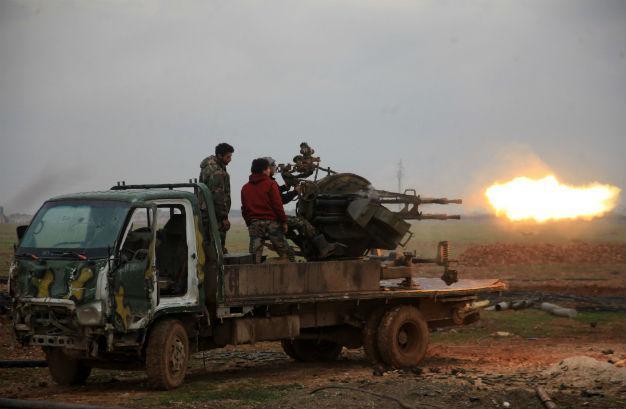Agreement on opposition needed for invites to Syria talks, delay possible: UN
UNITED NATIONS

AFP photo
The United Nations on Jan. 18 said it was waiting for regional powers spearheading the Syria peace process to agree on who will take part in talks scheduled to start in just one week’s time and raised the possibility of a delay, as the foreign ministers of the head of the two camps in the Syrian war, U.S. and Russia, are to meet in Zurich on Jan. 20 to talk about Syria.The peace talks, the first between the Syrian government and the opposition since 2012, are scheduled to open in Geneva on Jan. 25, but invitations have yet to be sent to the delegations.
The 17 countries pushing for a peace deal, including the United States, Russia, Saudi Arabia, Iran and Turkey, have been struggling to agree on the list of opposition leaders who will have a seat at the negotiating table.
“At this stage, the U.N. will proceed with issuing invitations when the countries spearheading the international Syrian Support Group process come to an understanding on who among the opposition should be invited,” AFP quoted said Farhan Haq, deputy spokesman for the U.N. secretary-general, as saying on Jan. 18.
U.N. Secretary-General Ban Ki-moon “urges those countries to redouble efforts to reach that agreement,” Haq said.
The Geneva talks are to pave the way to a new constitution and elections in 18 months to end Syria’s five-year war, which has killed more than 260,000 people and triggered a mass refugee exodus to Europe.
The U.N. spokesman said there were “concerns about arrangements” that had yet to be resolved for the talks to go ahead and added: “If there is any kind of slippage, we will let you know.”
Kerry, Lavrov to meet in Zurich
This announcement came two days before U.S. Secretary of State John Kerry and Russian Foreign Minister Sergei Lavrov were to meet in Zurich to talk mainly about Syria and also Ukraine.
Saudi Arabia in December 2015 hosted a meeting of armed factions and opposition groups to agree on a common platform in negotiations with the Damascus regime, but Russia has said that effort did not include all players.
A key ally of the Syrian regime, Moscow wants the moderate opposition that is closer to President Bashar al-Assad to take part.
“If some well-known opposition leaders are not invited, it’s going to make the delegation less inclusive than it should be,” said Russian Ambassador Vitaly Churkin.
The U.N.’s Syria envoy, Staffan de Mistura, told the U.N. Security Council during a closed-door briefing that “additional work needs to be done” before he can send out invitations, Churkin told reporters.
But he added that Jan. 25 remained the target and that it was “important to stick to that date.”
Asked about the prospects for a delay, Uruguay’s Ambassador Elbio Rosselli, who holds this month’s council presidency said that “no different date was considered today.”
During his briefing to council members, De Mistura stressed the importance of lifting sieges and allowing more humanitarian aid to reach civilians, many of whom have been surviving on very little food.
President Vladimir Putin held talks in Moscow with the emir of Qatar on the Syrian crisis. Russian Foreign Minister Sergei Lavrov said both Moscow and Doha were expecting that, in accordance with a U.N.-backed plan, talks between the Syrian government and the opposition would begin “in the nearest future, already this month.”
















